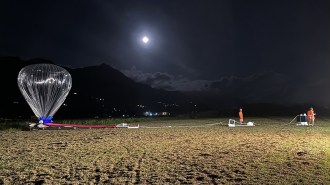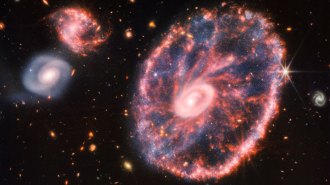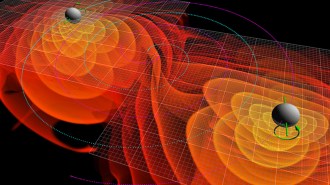News
-
 Space
SpaceHow balloons could one day detect quakes on Venus
A new study opens the door for future balloon-based missions to study the geology of other worlds.
By Freda Kreier -
 Animals
AnimalsRelocated beavers helped mitigate some effects of climate change
Along a river in Washington state, the repositioned beavers built dams that lowered stream temperatures and boosted water storage.
-
 Cosmology
CosmologyScientists mapped dark matter around galaxies in the early universe
A technique used to reveal dark matter could also shed light on a disagreement about the clumpiness of matter in the cosmos.
-
 Astronomy
AstronomyMini-Neptunes may become super-Earths as the exoplanets lose their atmospheres
Starlight is eroding the atmospheres of a handful of gassy exoplanets that are a bit smaller than Neptune, gradually exposing the rocky cores within.
By Liz Kruesi -
 Cosmology
CosmologyThe Windchime experiment could use gravity to hunt for dark matter ‘wind’
Though decades away, the project hopes to use an array of ultrasensitive sensors as a “wind chime,” jostled by dark matter blowing past Earth.
-
 Tech
TechScientists turned dead spiders into robots
In a new field dubbed “necrobotics,” researchers used a syringe and some superglue to control the dead bodies of wolf spiders.
By Asa Stahl -
 Health & Medicine
Health & MedicineA shot of immune proteins may protect against malaria for months
A monoclonal antibody for malaria passed an early hurdle and now will be tested in children in Africa, who are most at risk of dying from the disease.
-
 Astronomy
AstronomyA new James Webb telescope image reveals a galactic collision’s aftermath
Bright and dusty spokes of star formation connect the Cartwheel Galaxy’s inner and outer rings in a new image from NASA’s James Webb Space Telescope.
-
 Neuroscience
NeuroscienceAn hour after pigs’ deaths, an artificial system restored cellular life
Sensors, pumps and artificial fluid staved off tissue damage in pigs after cardiac arrest. The system may one day preserve organs for transplantation.
-
 Animals
AnimalsHow slow and steady lionfish win the race against fast prey
Lionfish overcome speedy prey with persistent pursuit, waiting for the perfect moment to strike. Other slow predatory fish may use the technique too.
By Jake Buehler -
 Physics
PhysicsTwo black holes merged despite being born far apart in space
A closer look at gravitational wave data reveals 10 overlooked mergers, including one between black holes that probably found each other late in life.
-
 Science & Society
Science & SocietyFriendships with rich people may help lift children out of poverty
For poor children, forming connections to richer peers is linked to greater earnings later in life, researchers say.
By Sujata Gupta